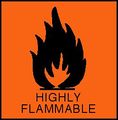2-propanol material data safety sheet. Reproduced with kind permission of the Department of Chemistry, Oxford University.
Last updated March 2, 2006
| Common synonyms |
- Isopropanol,
- Isopropyl alcohol
- Rubbing alcohol
|
| Formula |
CH3CHOHCH3
|
| Properties |
- Form: colourless liquid with an alcohol smell
- Stability: Stable, but highly flammable
- Melting point: -89 C
- Water solubility: high
- Specific gravity: 0.79
- Flash point: 12 C
|
| Principal hazards |
- 2-propanol is very flammable. It can be ignited by flames, but also by contact with such items as hot plates or hot air guns.
|
| Safe handling |
- Wear safety glasses.
- Make sure that the area in which you work is well ventilated, so that it is not possible for high concentrations of the vapour to form.
- Work well away from possible sources of ignition, such as hot plates and Bunsen burners..
|
| Emergency |
- Eye contact: Immediately flush the eye with plenty of water. If irritation persists, call for medical help.
- Skin contact: Wash off with soap and water. Remove any contaminated clothing in a safe area. Be especially careful if a large volume of 2-propanol has been spilled on clothes, since there is the risk of very serious burns if the clothing catches fire. If the skin reddens or appears damaged, call for medical aid.
- If swallowed: Call for medical help.
. |
| Disposal |
- Small amounts of 2-propanol can be flushed down a sink with a large quantity of water, unless local rules prohibit this. However, this material constitutes a fire risk; if large amounts of it are flushed down a sink dangerous concentrations may build up in the vapour phase in sewers.
- If any 2-propanol is poured into a sink, check that it is thoroughly flushed away. If some remains, a high concentration may build up in the air within the sink, presenting a fire risk. td>
|
| Protective equipment |
- Safety glasses.
- If you need gloves, butyl rubber is a suitable material.
|
| Further information |
More extensive safety data |
Bio-rich-time-poor 20:48, 25 June 2011 (BST)
